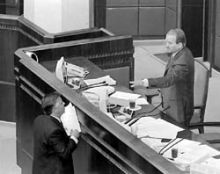The election bill intrigue unfolded in parliament as soon as the document was put to the vote. Almost immediately came the bad news of a bomb allegedly planted on the premises. The People’s Deputies, however, decided to continue working. Even the presence of the bomb squad with specially trained dogs in the audience was ignored, but the president’s veto was not overridden in the explosive atmosphere. There were just 242 ayes from 337 lawmakers present and registered. A secret ballot was used, despite Roman Bezsmertny’s remark that “politicians should have no cause to hide their stand.” After that the president’s amendments were debated and 244 people’s deputies voted for Leonid Kuchma’s 50/50 nomination ratio. This caused some confusion. Mr. Bezsmertny later said he “did not believe events would take this course” and was “unprepared” for it.
Not so Oleksandr Volkov, leader of the Democratic Union: “The president made it clear that the 75/25 ratio wouldn’t work. It didn’t. So why should we fight over it?” He added, however, that debating the other amendments was difficult, meaning that serious opposition could be expected. “You let the baby play so that it keeps quiet,” he said after the parliament voted down a number of presidential amendments.
The Communists said they would fight to the last man, but after the first amendment there were whispers in the Red rows about the Right turning traitor. “Factions that previously campaigned for the proportional system has now retreated,” The Day was told by Communist Heorhy Kriuchkov. “Our three factions voted that way because any other proportion would be vetoed by the president, so we’d start elections on October 4 under the old law and wouldn’t be able to change anything.”
“Both Rukhs had to choose between bad and very bad,” UNR leader Yuri Kostenko explained. The gap in the ranks of those fighting to override the veto was becoming increasingly obvious, but finally the bill was passed by 230 votes “in general” with most of the presidential amendments duly taken into account.
The new law provides for nomination from one-seat constituencies, from political parties and their blocs, and for self-nomination. To get seats in parliament, a party has to hurdle the 4% barrier. Territorial election committees are formed by the Central Election Committee and the district ones by the territorial committees. All election committees are to be set up as submitted by parties or blocs taking part in the elections. Only parties that surmount the 4% barrier during the previous elections can take part in the formation of the district election committees. The law further specifies that a candidate deputy can be nominated by a party registered not later than a year prior to the election; an election bloc of parties is valid only if it is made up of parties registered not later than a year prior to the election date. A candidate may be nominated by a party in a one-seat constituency not only by that party but also by conferences of regional organizations. The committee registers candidates on party rosters if they are each signed for by at least 500,000 voters supporting the roster or bloc (plus at lest 17,000 signatures in each of two- thirds of the regions of Ukraine).
And thus the election bill saga has a happy ending. “It’s important for the law to be signed by the president as soon as possible, so the Central Election Committee can prepare quickly,” Central Elections Commission Chairman Mykhailo Riabets told The Day, sounding oh so businesslike.







